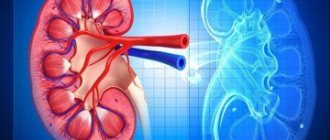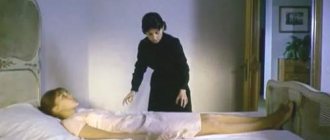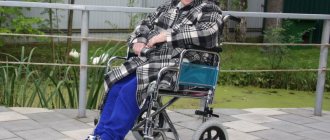Causes of senile psychosis
At the age of over 60, certain changes occur in the human body: atrophic processes begin, various diseases and their consequences accumulate over the previous years, social status changes (retirement, changes in family relationships), personal characteristics become sharper, etc.
All this leaves its mark on the mental state of an elderly person. We can say that it is during this period of life that the human psyche is the weakest and most susceptible to disease.
The causes of senile psychosis are varied: from hereditary predisposition and alcohol abuse to exacerbation of diseases of internal organs (arrhythmias, bronchitis, etc.) and infection and poisoning.
Relatives of the patient who observe changes in the behavior of an elderly person can assume the presence of senile psychosis. Only a doctor can make such a diagnosis after examining the patient and assessing his condition.
Diagnosis and treatment of senile psychosis is carried out by a psychiatrist with a special education (medical university + specialization in psychiatry at least every 5 years).
Treatment of senile psychosis begins with identifying the causes and mechanisms of development of the disease. Often, a careful examination by a psychiatrist of the patient and collection of anamnesis (life history and illness) from his relatives is sufficient to establish the factors that triggered the disease. But in some cases additional examination may be required:
- tests (blood, urine, cerebrospinal fluid),
- pathopsychological and neuropsychological examination,
- electroencephalography (routine or daily monitoring),
- brain tomography (CT or MRI),
- Ultrasound of the brain and blood vessels,
- consultations with related specialists: neurologist, neurosurgeon, surgeon, therapist, cardiologist, urologist, etc.
Elimination (or compensation) of the identified causes and mechanisms of development of senile psychosis in combination with general restorative techniques is the basis for the treatment of this disease.
Senile psychosis
Senile, or senile, psychosis is included in the group of mental illnesses of old age, accompanied by mental disturbances and clouding of consciousness against the background of brain atrophy. Symptoms of the disease usually appear after 65 years of age and partially resemble manifestations of senile dementia . What distinguishes senile psychosis from the latter is at least the limited nature of the decline in intelligence.
Causes
The etiology of the disease is not fully understood. Most studies, however, indicate that underlying atrophic changes in the brain are related to factors such as:
- Heredity. The influence of genetic predisposition explains cases of familial psychosis in old age.
- Degenerative processes associated with age, involution of the endocrine glands.
- Chronic diseases of organs and systems (cardiovascular, genitourinary, respiratory), acute infectious processes affecting brain cells (meningitis, encephalitis).
- Chronic insomnia, pathology of the organ of vision and hearing, loneliness.
- Irrational one-sided nutrition, vitamin deficiency, physical inactivity, bad habits.
Forms of senile psychosis and their clinical picture
The symptoms of the disease depend directly on the affected area of the brain affected by atrophy. Pathologies united by the term senile psychosis are classified into two groups depending on the nature and rate of increase of symptoms.
Acute forms
Occurring against the background of somatic pathology, acute senile psychosis is associated with delayed diagnosis and untimely treatment of diseases in the elderly. Symptoms usually develop suddenly. In some situations, an exacerbation is preceded by a prodrome period lasting up to 3 days (appetite disturbance, sleep disorders, problems with spatial orientation and self-care). An acute attack is accompanied by symptoms:
- excessive fussiness, increased physical activity;
- decreased attention and memory, apathy and emotional dullness or aggression and agitation;
- disturbances of consciousness, delusions, hallucinations, unreasonable fears for one’s own life, persecution mania;
- exacerbation of the underlying somatic disease.
Acute senile psychosis can occur evenly from two days to 2-3 weeks or be characterized by waves.
Outbursts are replaced by extinction of symptoms with accompanying adynamia, apathy and weakness. Chronic forms
Chronically current senile psychosis is characterized by a slow rate of increase in symptoms. Depending on the nature of mental disorders, the following types are distinguished:
- Depressive disorders. Most common in older women, it ranges from mild forms with lethargy and depressed mood to deep depression.
- Senile paranoia. Distinctive signs are delusional thoughts, an exaggerated sense of fear for the safety of property and one’s own life.
- Hallucinosis. Visual, auditory and tactile hallucinations and illusions arise against the background of preserved clear consciousness.
- Hallucinatory-paranoid disorders. They belong to complex forms of mental disorders in the elderly, difficult to distinguish from manifestations of schizophrenia. They combine delusional ideas with hallucinations, usually of a visual nature.
- Paraphrenia of the elderly. A complete rethinking of one’s own personality leads to a violation of self-perception and association of oneself with another person or a fictional character. This disorder is usually persistent and occurs in old age.
Diagnosis and treatment
Diagnosis based on the clinical picture of psychosis is often complicated by its hidden course. The disease can be hidden under the guise of other pathologies of old age or associated with a natural change in character in the elderly. In acute psychosis, accompanied by a stormy clinic, making a diagnosis is not difficult. In doubtful situations, as well as to exclude vascular diseases, cerebral blood flow disorders and brain tumors that can give similar symptoms, a CT scan is performed.
There is no specific treatment for senile psychosis. Symptomatic therapy is aimed primarily at alleviating symptoms and preventing the progression of the disease. If it is timely, acute senile psychosis is easier to correct, in contrast to its chronic forms, which are associated with an unfavorable prognosis for recovery.
Medicines (psychotropics) are prescribed strictly individually under the strict supervision of a specialist. In addition to pharmacological methods, the use of psychotherapy, social rehabilitation and cognitive training aimed at correcting memory and attention disorders is effective.
And, of course, we should not forget about competent care for an elderly patient suffering from senile psychosis. The care and attention of others towards such a patient can sometimes do more than the pills he takes.
Treatment of senile psychoses is possible at home
To do this, you should invite a psychiatrist to your home, who will clarify the condition and give recommendations on therapy, supervision and care.
In cases of gross behavioral disturbances in the form of aggression, suicidal intentions, confusion with a danger to the life of the patient or others, hospitalization in a specialized hospital will be required. In this case, the patient can be delivered to the clinic independently or call an ambulance or special services for transporting patients to the home.
Hospitalization of patients with senile psychoses is possible both in public psychiatric clinics and in private ones.
Diagnosis of senile psychosis
When patients with signs of senile psychosis come to the Yusupov Hospital, psychiatrists with many years of experience study the clinical picture of the disease. Violation of mental functions is manifested by the severity of symptoms, the stability of their manifestations, the presence of delusions and hallucinations, and the absence of gross cognitive impairment.
The unity of diagnostics of mental and physical states is aimed at identifying somatic pathologies. The Yusupov Hospital has a modern diagnostic base, equipped with European equipment for MRI and CT and other studies. Based on the results of the examination, highly qualified psychiatrists, together with other specialists, develop a treatment program, the implementation of which is often most effective in a hospital setting.
Psychoses of late age require regular therapeutic measures, which at the initial stage are aimed at suppressing manifestations. When placing a patient in the comfortable wards of the Yusupov Hospital, specialists have the opportunity to monitor his condition, determine the effectiveness of the chosen methods and make adjustments to the treatment plan.
Mental disorders in cerebral vascular pathology
They arise as a result of cerebral circulation disorders in diseases such as atherosclerosis, hypertension, intracranial aneurysms, vasculitis, and cerebral vascular amyloidosis. Significantly more frequent in the second half of life. They account for about a third of all cases of mental pathology in people over 60 years of age. There is no direct relationship between mental disorders and the nature and severity of vascular pathology. Other reasons also take an active part in the development of mental disorders: heredity, constitution, somatic diseases, age-related changes in the brain, trauma, etc., and often endogenous mental diseases. There are three groups of mental disorders of vascular origin: exogenous-organic, endoform and vascular dementia.
Treatment methods for senile psychosis
Treatment includes medications and psychotherapeutic methods. The choice depends on the severity of the condition, the type of disorder and the presence of somatic diseases.
Medication
Consists in the use of the following groups of drugs:
1. Neuroleptics - reduce excessive transmission of nerve impulses, soften delusional, hallucinogenic and depressive states of the patient:
- Aminosine;
- Sonapax;
- Eglonil.
2. Antidepressants - help get rid of depression by increasing the amount of adrenaline and improving mood. Popular drugs in this group:
- Melipramine;
- Amitriptyline;
- Fluoxetine.
3. Sleeping pills - help make it easier to fall asleep and also ensure long-lasting deep sleep.
- Phenozepam;
- Phenobarbital;
- Melatonin.
The specialist prescribes combination drug therapy, selecting drugs depending on the symptoms of psychosis.
In parallel, it is necessary to treat a somatic disease if it is the cause of the disorder.
Psychotherapeutic
The method involves the patient working with a psychotherapist. The psychotherapeutic method perfectly corrects senile psychoses and gives a positive result in combination with drug therapy.
Specialists conduct mainly group classes. In such conditions, patients find a new social circle, united by common interests. A person can begin to openly talk and get rid of his problems, worries and fears in a circle of like-minded people.
The most effective methods of psychotherapy are:
- Occupational therapy. Usually after retirement a person feels unclaimed. Therefore, older people are offered to engage in feasible physical or intellectual activities that will help them calm down and take their minds off painful thoughts.
- Discussion technique. It is a discussion of the most pressing issues of old age and the difficulties of social relationships.
- Art therapy. During classes, patients draw and make crafts. It brings people together and gives them the opportunity to express themselves.
- Color therapy. The influence of light on the human psyche has long been proven. Red excites, green calms.
- Reading therapy. The doctor selects appropriate books for the patient that have the necessary subtext. The patient's task is to read these books and make notes. Then there is a joint analysis and discussion of what has been read.
Senile psychoses cause inconvenience not only to the patient himself, but also to the people around him. For a favorable prognosis, it is necessary to seek correct treatment in time.
Acute psychosis: symptoms
Acute psychosis is characterized by pronounced changes in a person’s behavior and disturbances of consciousness that occur suddenly and unexpectedly. The main manifestations of this mental disorder are:
- development of visual, tactile and auditory hallucinations, delusions;
- unstable emotional state, characterized by violent emotions, sudden changes in mood, aggression;
- inadequate perception of reality and oneself in society and the world;
- partial or complete memory loss;
- deterioration of cognitive functions;
- obsessions;
- disorientation in space.
The multidisciplinary Yusupov Hospital offers the services of qualified specialists in the field of psychiatry with an academic degree. In the treatment of psychosis, modern methods and means are used that help relieve symptoms and restore the patient’s mental state.
Acute psychosis, the symptoms and signs of which appear most often in women, has a cyclical nature of manifestation. So, after acute psychosis, remission occurs, which can stop due to the action of a provoking factor. Professional treatment of acute psychosis is a measure necessary to exclude recurrent psychoses.









